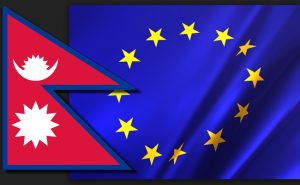 The European Union and Nepal held the 10th Meeting of their bi-annual Joint Commission on 28 June 2018 in Brussels. The last meeting took place in Kathmandu in November
The European Union and Nepal held the 10th Meeting of their bi-annual Joint Commission on 28 June 2018 in Brussels. The last meeting took place in Kathmandu in November
2015.
The participants discussed a wide range of issues of mutual interest. The meeting took place in an open and constructive atmosphere allowing for a thorough exchange on the latest developments in the European Union and in Nepal. There was discussion on the successful holding of local, provincial and federal elections in Nepal in 2017 and the EU congratulated Nepal on this major political milestone. The EU informed the Nepali delegation of recent political developments in the EU, including the new Multiannual Financial Framework, the EU Permanent Structured Cooperation (PESCO) in the field of security and defense, and several other policy initiatives. The Nepali side shared plans and priorities of their Government for the forthcoming period. Nepal informed the EU delegation that, with the completion of elections, the Constitution had come into full operation. The Nepali delegation also outlined its strategies of graduation from Least- Developed-Country (LDC) status.
The main outcomes of the EU and Nepal Sub-Commission on Development, which met on 27 June, were presented: the development priorities of the new Government of Nepal were discussed; and the EU provided updates on the mid-term review of the Multiannual Indicative Programme 2014-2020 as well as the project pipeline for 2018-2020.
The EU and Nepal took stock of the implementation of ongoing cooperation, and expressed their satisfaction at the progress made in various areas of cooperation e.g.: in particular, in the education sector (primary, secondary and vocational education); in nutrition, where Nepal is pioneering the multi-sector nutrition plan and in rural development by adding value to certain products like coffee to stimulate job creation and the growth of economy. Both parties concurred that such cooperation should continue to be guided by government’s priority areas.
On the occasion of the Joint Commission both parties signed the Financing Agreement for the EU Contribution to Agriculture and Rural Development (CARD) in Nepal worth €40 million of which €36 million has been earmarked for budget support and €3.75 million for complementary measures. In addition, under the School Sector Development Programme (SSDP), the EU released the amount of €19.094 million under the budget support modality to the treasury of Nepal. This payment constitutes a part of the overall €61.4 million EU support to Nepal’s School Sector Development Plan.
Both parties discussed the macro-economic situations in the EU and in Nepal respectively. There was also an in-depth exchange on their trade relations, where they reiterated the importance for Nepal of taking greater advantage of trade preferences granted to Nepal by the EU under the Everything but Arms scheme (EBA). The EU reiterated its continued support to enhancing Nepal’s trading capacity including through trade facilitation measures, and product development. Investment opportunities under the Asia Investment Facility and cooperation with the European Investment Bank were also discussed.
Air safety was also on the agenda, with both parties aiming to address outstanding safety and security issues. The EU congratulated Nepal on the significant, increasing interest and successful application of Nepali students in the Erasmus+ programme. This is a trend the EU wants to further encourage.
The EU and Nepal recognized the importance of regional integration and commitment towards better cooperation under the regional initiatives of the South Asian Association for Regional Cooperation (SAARC) and The Bay of Bengal Initiative for Multi-Sectoral Technical and Economic Cooperation (BIMSTEC). The EU and Nepal shared their commitment towards the realization of the Sustainable Development Goals (SDGs) within the stipulated timeframe and stressed the need to work together in collaborative partnership.
Protection and promotion of Human Rights including that of vulnerable groups and fighting against human trafficking also figured during the discussion. The EU congratulated Nepal on their election to the United Nations Human Rights Council.
The EU and Nepal expressed their commitment to the full respect for democratic principles, rule of law, good governance, human rights and fundamental freedoms. In this regard, the EU and Nepal agreed on close cooperation in the multilateral fora. Both sides reaffirmed their commitment to strengthen the global response to the threat of climate change from all countries and to work for ambitious climate action towards the full and effective implementation of the United Nations Framework Convention on Climate Change and the Paris Agreement. They shared the views that Nepal is disproportionately affected by the impact of climate change and that the EU remains committed to support climate action to reduce emissions and to increasing the resilience to climate change of developing countries.
The Joint Commission was [co-]chaired by Paola Pampaloni, EEAS Deputy Managing Director for Asia and Pacific, for the European Union. Shanker Das Bairagi, Nepal’s Foreign Secretary, led the delegation of Nepal. The next EU-Nepal Joint Commission will take place in Nepal in 2020.
(Based on a press note issued by the EU office in Nepal: Ed).
